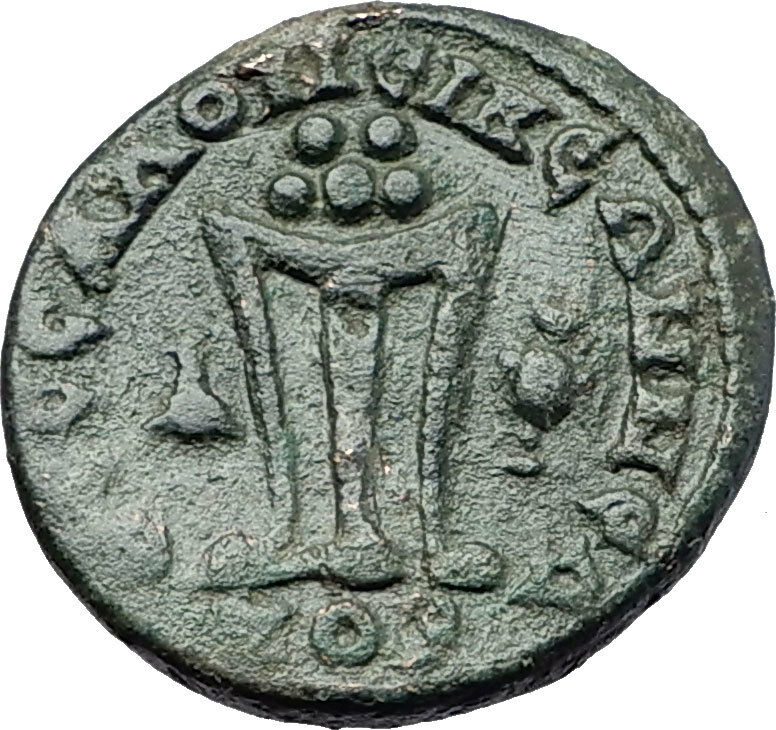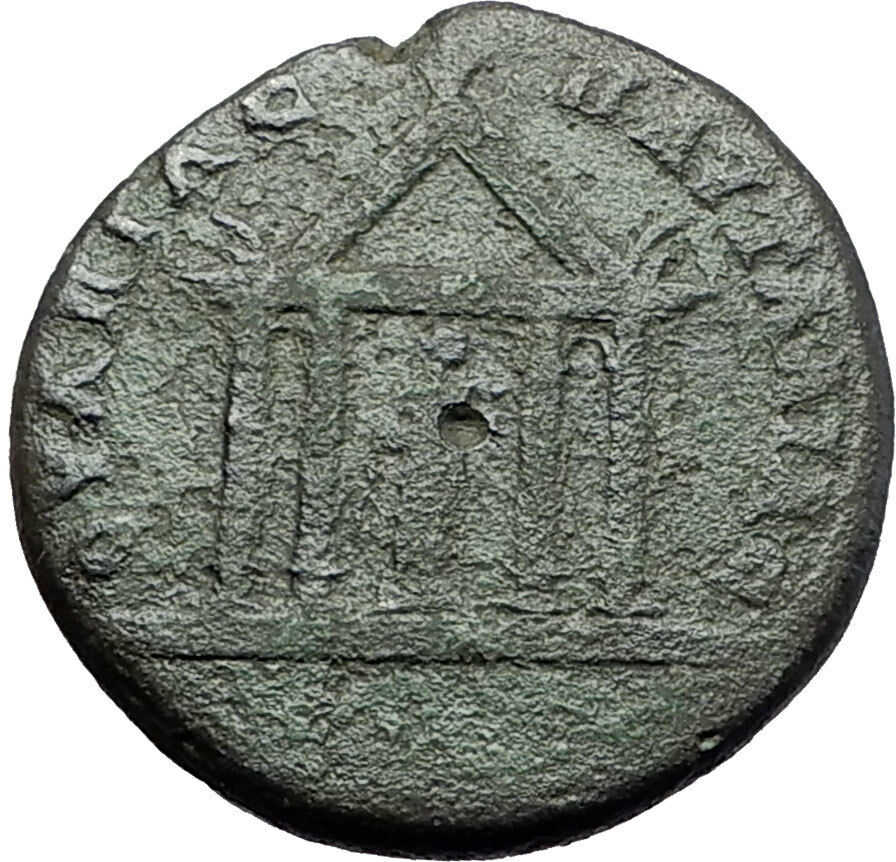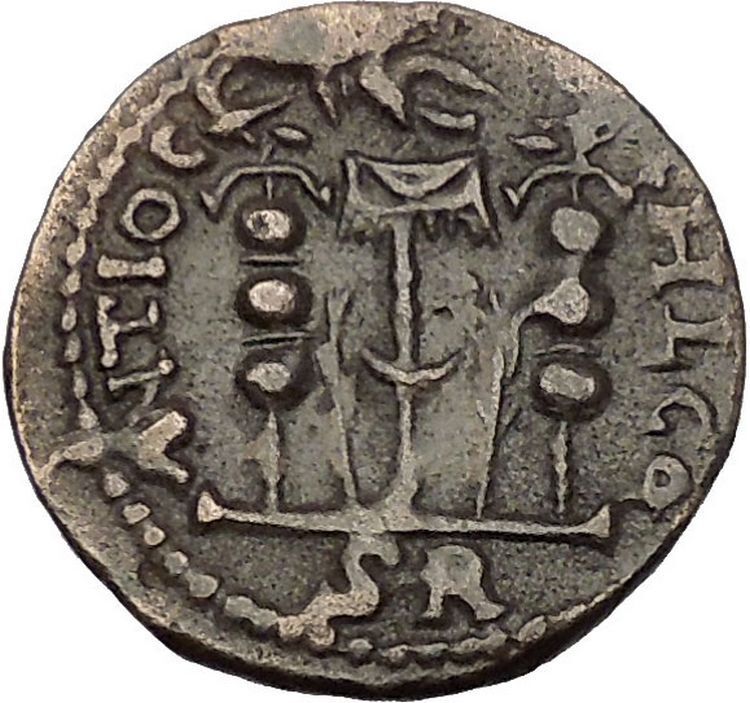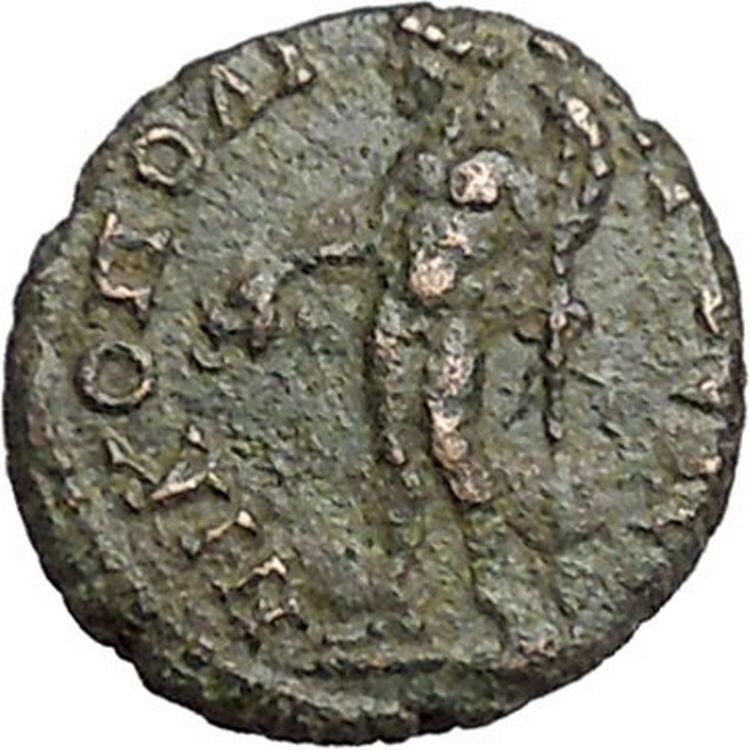|
Britannicus (or Possibly Nero) as Caesar
Bronze 17mm (3.93 grams) of Smyrna in Ionia. Struck circa 50-54 A.D.
Philistos and Eikadios, magistrates.
Reference: RPC I 2476 (as ‘Nero’); SNG Copenhagen 1351; SNG von Aulock 7995
Certification: NGC Ancients VF 5872305-011
Draped bust right; ZMY below.
ЄΠI ΦIΛIΣTOY – ЄIKAΔIOΣ Nike advancing right, holding trophy over her left shoulder.
You are bidding on the exact item pictured, provided with a Certificate of Authenticity and Lifetime Guarantee of Authenticity.
Tiberius Claudius Caesar Britannicus (c. 12 February AD 41 – 11 February AD 55), usually called Britannicus, was the son of Roman emperor Claudius and his third wife Valeria Messalina. For a time he was considered his father’s heir, but that changed after his mother’s downfall in 48, when it was revealed she had a bigamous marriage without Claudius’ knowledge. The next year, his father married Agrippina the Younger, Claudius’ fourth and final marriage. Their marriage was followed by the adoption of Agrippina’s son, Lucius Domitius, whose name became Nero as a result. His step-brother would later be married to his sister Octavia, and soon eclipsed him as Claudius’ heir. Following his father’s death in October 54, Nero became emperor. The sudden death of Britannicus shortly before his fourteenth birthday is reported by all extant sources as a poisoning on Nero’s orders – as Claudius’ natural son, he represented a threat to Nero’s claim to the throne.
Son of Claudius and Valeria Messalina | Brother of Claudia Octavia | Half-Brother of Claudia Antonia | Step-brother of Nero | Cousin of Nero Caesar, Drusus Caesar, Caligula, Agrippina Junior, Drusilla, Tiberius Gemellus, Germanicus Gemellus and Julia Livilla
Nero – 54-68 A.D.
Caesar, 50-54 (Under Claudius)
| Son of Agrippina Junior (by Ahenobarbus) | Husband of Claudia Octavia, Poppaea and Statilia Messalina | Father of Claudia Neronis | Adopted son, grand-nephew, and successor of Claudius | Step-brother of Claudia Antonia, Britannicus and Claudia Octavia | Nephew of Caligula | Grandson of Germanicus and Agrippina Senior | Great-grandson of Agrippa, Julia, Nero Claudius Drusus and Antonia |
 Nero (Latin: Nero Claudius Caesar Augustus Germanicus;15 December 37 – 9 June 68) was Roman Emperor from 54 to 68, and the last in the Julio-Claudian dynasty. Nero was adopted by his great uncle Claudius to become his heir and successor, and succeeded to the throne in 54 following Claudius’ death. Nero (Latin: Nero Claudius Caesar Augustus Germanicus;15 December 37 – 9 June 68) was Roman Emperor from 54 to 68, and the last in the Julio-Claudian dynasty. Nero was adopted by his great uncle Claudius to become his heir and successor, and succeeded to the throne in 54 following Claudius’ death.
During his reign, Nero focused much of his attention on diplomacy, trade, and enhancing the cultural life of the Empire. He ordered theaters built and promoted athletic games. During his reign, the redoubtable general Corbulo conducted a successful war and negotiated peace with the Parthian Empire. His general Suetonius Paulinus crushed a revolt in Britain. Nero annexed the Bosporan Kingdom to the Empire and began the First Roman-Jewish War.
In 64, most of Rome was destroyed in the Great Fire of Rome, which many Romans believed Nero himself had started in order to clear land for his planned palatial complex, the Domus Aurea. In 68, the rebellion of Vindex in Gaul and later the acclamation of Galba in Hispania drove Nero from the throne. Facing assassination, he committed suicide on 9 June 68 (the first Roman emperor to do so) His death ended the Julio-Claudian Dynasty, sparking a brief period of civil wars known as the Year of the Four Emperors. Nero’s rule is often associated with tyranny and extravagance. He is known for many executions, including that of his mother, and the probable murder by poison of his stepbrother Britannicus.
He is infamously known as the Emperor who “fiddled while Rome burned” and as an early persecutor of Christians. He was known for having captured Christians to burn them in his garden at night for a source of light. This view is based on the writings of Tacitus, Suetonius, and Cassius Dio, the main surviving sources for Nero’s reign. Few surviving sources paint Nero in a favorable light. Some sources, though, including some mentioned above, portray him as an emperor who was popular with the common Roman people, especially in the East. Some modern historians question the reliability of ancient sources when reporting on Nero’s tyrannical acts.
|









 Nero (Latin: Nero Claudius Caesar Augustus Germanicus;15 December 37 – 9 June 68) was Roman Emperor from 54 to 68, and the last in the Julio-Claudian dynasty. Nero was adopted by his great uncle Claudius to become his heir and successor, and succeeded to the throne in 54 following Claudius’ death.
Nero (Latin: Nero Claudius Caesar Augustus Germanicus;15 December 37 – 9 June 68) was Roman Emperor from 54 to 68, and the last in the Julio-Claudian dynasty. Nero was adopted by his great uncle Claudius to become his heir and successor, and succeeded to the throne in 54 following Claudius’ death.




